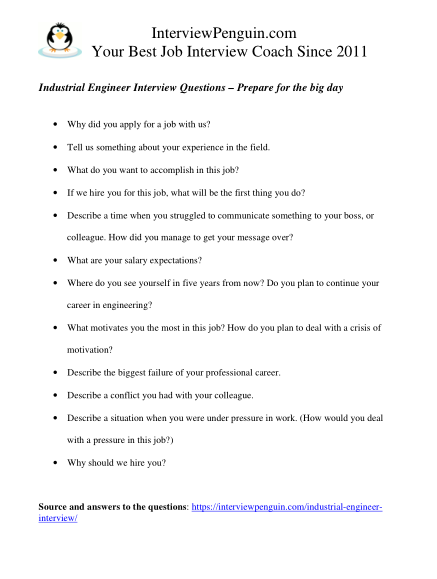Surprisingly enough, technical questions do not prevail in the interviews for this position. HR managers and other interviewers will ask you primarily personal and behavioral questions. They will inquire about your motivation, experience, goals, and attitude to various situations that happen in the workplace.
You may have to answer two or three questions that relate to the efficiency of production process, or to safety regulations. The questions won’t be difficult though. Most employers trust the educational system. What is more, it is hard to truly test your engineering skills in an interview. Therefor, if you make a good impression on them, if you show motivation and enthusiasm, and if your resume meets their expectations, they will hire you and give you a chance to prove your skills in the real job. Let’s have a look at the questions you will face.
Table of Contents
Why did you apply for a job with us?
Try to find a connection with the company. Perhaps you are interested in the particular field of business or final product, or their values and goals resonate with your values and goals. You can also refer to particular duties from the job description, saying either that you have experience with them (from your past jobs), or that they sound really interesting to you.
Lastly you can point out a great location of the manufacturing plant. Perhaps it is near your apartment, or you have a good connection with the place, or you like the city/village where it stands. One way or another, you should answer this question in a way that they feel your honest interest to work for them, and not just for anyone.
Tell us something about your experience in the field
This question is easier when you have some experience under your belt. If it is a case, talk about things you did in your former jobs, and focus on achievements–the good things you have done for your employer.
For example, if you managed to improve the effectiveness of certain process, or reduced cost and waste, or designed new manufacturing routes that helped them to reduce staff costs, it will be great to mention these things in your interview. And what to do if this is your first job application?
Be honest. Talk about things you learned at school, but do not pretend to know something which you don’t. Emphasize that you are eager to learn and to put your creative mind to work, and believe to have all knowledge of theory which is necessary for success in this job.
What do you want to accomplish in this job?
A simple question helps us to understand a lot about your values, and the way you see your employment. Do you seek personal accomplishments, going to work only to earn money?
Or do you think about achievements from the perspective of an employer, and how your creative work can help them to prosper?
Try to talk about accomplishments that matter for the employer–reducing costs, improving efficiency of certain processes, ensuring that every wheel is at the right place…
* Do not forget to read: How to overcome interview nerves. Anxiety can kill your chances in any interview. Do not let it happen…
If we hire you for this job, what will be the first thing you do?
This is your opportunity to show the right attitude to work, systematic thinking, and also some humility. Tell them that you will do two things first:
- Consulting the employees, managers, other engineers, trying to understand the complexity of the production processes, and each part of the manufacturing process (or the parts you will respond for, when they employ more industrial engineers).
- Observe the processes, make notes, conduct analysis, and look for areas of production that can be improved.
This is perhaps the best thing you can do once you start this job. You can go with something else, of course, but you should always have at least some plan.
Special Tip: You can download a full list of questions in a simple one-page long .PDF, and practice your interview answers anytime later:
Describe a time when you struggled to communicate something to your boss, or colleague. How did you manage to get your message over?
You won’t be isolated in your new job. You will talk to all levels of employees, ranging from laborers to executives. Now, what will you do? Will you stick to your language (technical language), and let the others to labor with the interpretation? Or will you step out of your comfort zone, and adjust your language to the skills and specialization of the person you’ll talk to?
I believe you know what the right answer is–at least from the perspective of your employer. To demonstrate the right attitude, you should talk about a situation when you used a simple language, charts, presentations, pictures, demonstration, and other ways of getting your message over. Show them that you do not mind going above and beyond for your colleagues.
What are your salary expectations?
I have experience with interviewing engineers for various jobs, ranging from IT to mechanical engineering. And I can say that most of them were fixed on the salary. They talked a lot about it. Obviously they can afford it (at least in some way they can), since engineers are in high demand, and companies struggle to hire skilled engineers, for a variety of positions.
Nevertheless, I still suggest you to not use this negotiating power in an interview–at least not in an early stage. Wait until they make an offer. Wait until the point when they really want you in their team–that’s the right time to make your move!
Once they ask you about the salary expectations, you can simply say that you will accept the average for the industry, or the same amount other industry engineers earn in their company. Emphasize that you want to prove your skills first. Once you prove them (in a real job), it will be easy to negotiate a raise… You can also check 7 sample answers to “What is your desired salary?” question, if you’re not sure what exactly to say.
Other questions you may get in your interview for industrial engineering job
- Where do you see yourself in five years from now? Do you plan to continue your career in engineering?
- What motivates you the most in this job? How do you plan to deal with a crisis of motivation?
- Describe the biggest failure of your professional career.
- Describe a conflict you had with your colleague.
- Describe a situation when you were under pressure in work. (How would you deal with a pressure in this job?)
- Why should we hire you?
Conclusion and next steps
Companies struggle to hire new engineers. They will be glad to hear good interview answers from you, so they can hire you for a job with clear conscience.
Prepare for the questions from our list, and dot forget to talk with enthusiasm. Show them that you really want the job, and that you want to help them prosper (and do not care only about your personal gains). If you manage to do it, they will hire you. At least most of the time…
Continue your interview preparation with us:
- Work portfolio for an interview – Learn how to prepare a selection of your best works, and how to use it to show the interviewers the value you can bring to their team.
- Construction manager interview questions.
- Aerotek interview questions.


